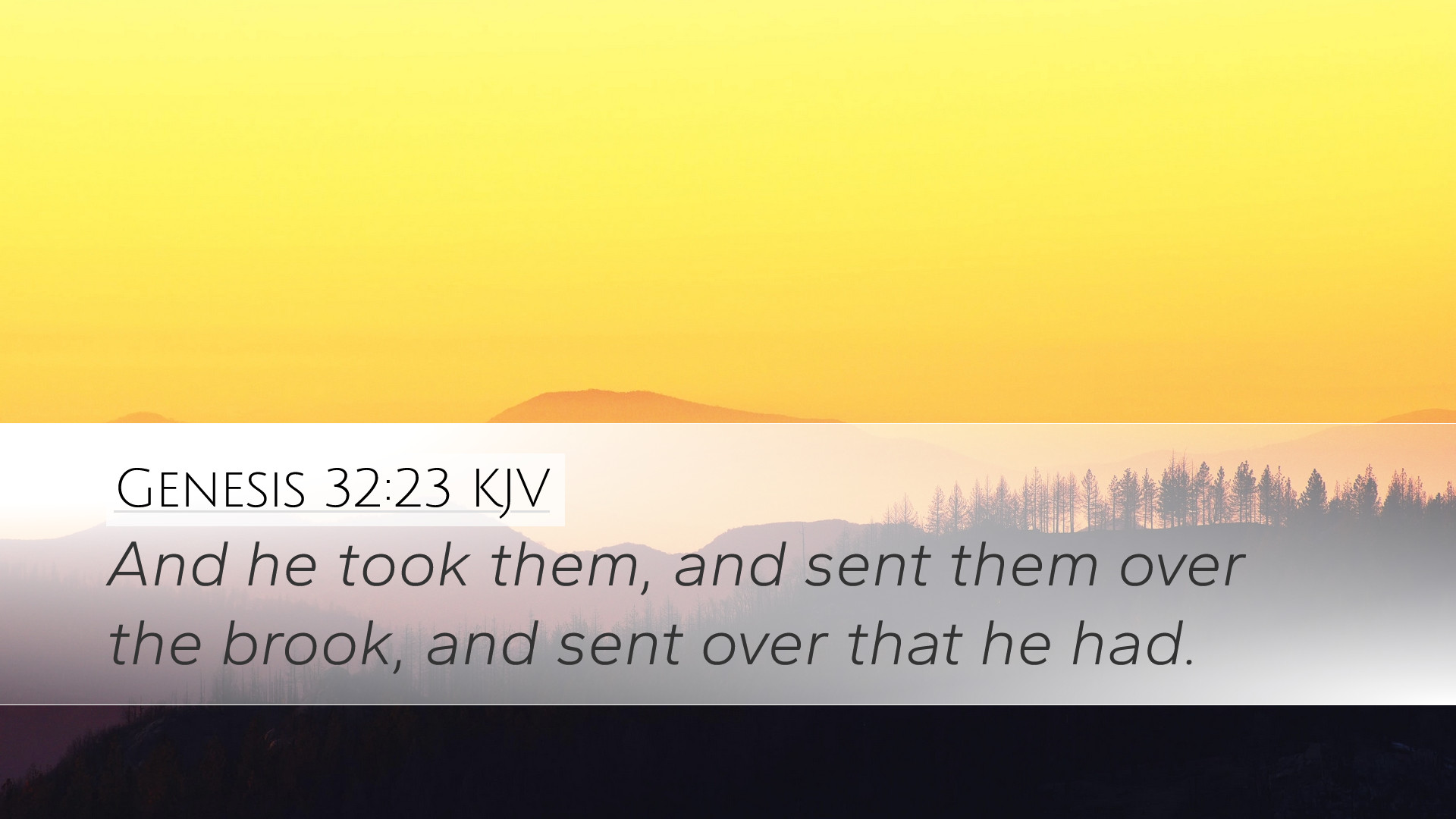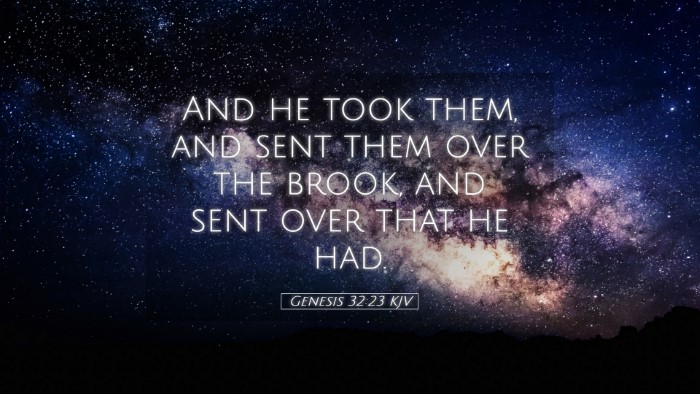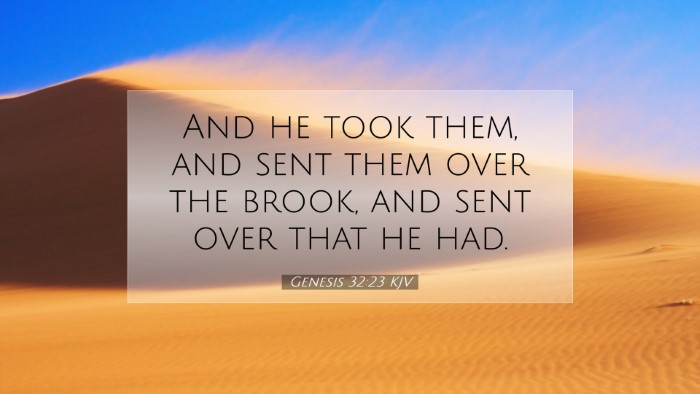Bible Commentary on Genesis 32:23
Text of Genesis 32:23: "And he took them, and sent them over the brook, and sent over that he had."
This verse marks a pivotal moment in the life of Jacob as he prepares to meet his estranged brother Esau. It is embedded in the broader narrative of Jacob's return to the land of Canaan after years of exile. The complexities of this passage invite deep reflection and analysis, and thus we turn to the insights of esteemed public domain commentaries.
Contextual Background
Jacob's life is characterized by conflict and transformation, embodying the struggles of faith and identity. After taking his brother's birthright and blessing, Jacob fled to Haran to escape Esau's wrath. This verse falls at a critical junction, encapsulating Jacob's tension as he approaches a potentially hostile encounter.
Historical Setting
Historically, Jacob's return symbolizes a reclamation of his inheritance and covenant promises. He is now facing the consequences of his earlier actions; thus, he is in a state of fear and uncertainty.
Significance of Actions Taken by Jacob
In this verse, we see Jacob acting decisively by sending his family and possessions across the brook. This action illustrates several key themes:
- Preparation and Strategy: Jacob's decision to send his family first indicates a strategic approach to a potentially dangerous confrontation with Esau. It reflects a blend of faith and pragmatism, as he prepares for the worst while hoping for the best.
- Isolation and Vulnerability: By sending his loved ones away, Jacob places himself in a position of vulnerability, an act that suggests a deep internal struggle. This moment of solitude may serve as a precursor to the transformative encounter he is about to experience.
- Faith in Divine Protection: The act of sending them over the brook can symbolize trust in God's providence. Jacob's journey is not merely a physical return but also a spiritual process of reconciliation with God and the past.
Commentary Insights
Matthew Henry's Perspective
Matthew Henry emphasizes the significance of Jacob's preparations. He points out that Jacob was not only concerned about his safety but also demonstrated a sense of duty towards his family. Henry notes the contrast between Jacob's past actions and his current humility, remarking on how fear can lead to a deeper reliance on God. He refers to this transformative moment as a way for Jacob to cast himself on God's mercy before facing Esau.
Albert Barnes' Commentary
Albert Barnes provides a detailed reflection on the implications of crossing the brook. He describes the brook as a place of separation, indicating the point at which Jacob must confront the reality of his circumstances. Barnes highlights the tension felt by Jacob, illustrating his dual motivations of seeking peace with Esau while embodying an acknowledgment of the past wrongs he has committed. This moment becomes a pivotal part of Jacob's journey toward reconciliation.
Adam Clarke's Analysis
Adam Clarke offers a deeper theological reflection on the significance of personal isolation. He observes that in moments of solitude, individuals often encounter divine truth. Clarke suggests that Jacob prepares to wrestle not only with Esau but also with God. This foreshadows Jacob's later encounter with the angel, representing the ongoing struggle between the old self and the new identity in God's promise.
Theological Implications
The actions of Jacob in Genesis 32:23 also provoke rich theological discussions:
- Identity and Transformation: The narrative of Jacob illustrates the theme of transformation through struggle. His encounter with Esau serves as a metaphor for confronting one's past and emerging renewed through faith.
- God's Sovereignty and Mercy: This passage accentuates the dual reality of human effort and divine providence. Jacob's preparations reflect human responsibility, while the overarching narrative stresses God's sovereignty and ability to redeem.
- Prayer and Dependence: Jacob's physical actions give way to spiritual dependence on God. The solitude preceding the encounter signifies a preparation of his heart to surrender to God’s will.
Practical Applications
For pastors, students, and theologians, Genesis 32:23 offers several practical applications:
- Embrace Vulnerability: Like Jacob, leaders must be willing to embrace vulnerability in their walk of faith. This allows for authentic encounters with God and others.
- Prepare for Encounter: Preparing one's heart before confronting difficult situations is essential. Jacob's strategy teaches that taking time for prayer and reflection is crucial for spiritual health.
- Live in Trust: Jacob's actions invite believers to live in a state of trust in God's providence, even when situations appear daunting or fearful.
Conclusion
Genesis 32:23 serves as a rich tapestry of human emotions and divine interaction. Through the lenses of various commentaries, we see a multifaceted understanding of Jacob's journey. His decision to separate from his family not only prepares him for potential confrontation but also sets the stage for profound personal transformation. The insights derived from Matthew Henry, Albert Barnes, and Adam Clarke enrich our comprehension, encouraging believers to embrace their struggles in faith, preparation, and reliance on God's mercy.


